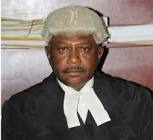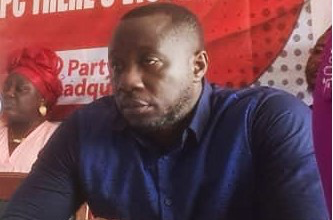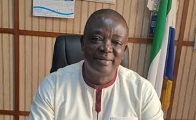When Judges Turn on Judges… Halloway’s Mandamus Threat Rocks the Judiciary

By Kelvin Jay
Justice Halloway has accused the Hon. Chief Justice, Desmond Komba Kamanda, of gross violations of the Constitution and acts amounting to human rights abuses against him. In a detailed statement, Justice Halloway claims the Chief Justice deliberately failed to establish a Judicial Ethics Committee to investigate formal complaints he made against him—an omission which, he says, constitutes a breach of administrative justice and the principles of the rule of law.
According to Justice Halloway, instead of addressing his complaint, the Chief Justice and the Judicial and Legal Service Commission (JLSC) engineered his purported suspension as a judge through a letter dated 15 September 2025, issued by Barba B. Fortune, Secretary to the President. The letter stated that “His Excellency the President hereby suspends you as a Judge with immediate effect until the outcome of a Disciplinary Tribunal instituted to investigate your conduct.”
Justice Halloway, however, contends that the suspension was unlawful and unconstitutional, arguing that the letter was neither signed by the President nor indicated that the Secretary was directed or instructed by the President to convey such a suspension.
“Clearly, a suspension by His Excellency the President cannot be deduced from the letter itself,” Justice Halloway wrote. “Since the President did not authorize or instruct such communication, the suspension is null and void.”
He further alleged that the letter was intended to “deceive the public into believing that His Excellency the President had suspended me when, in fact, he did not.”
Citing Section 137 of the 1991 Constitution, Justice Halloway argued that only the President, acting in accordance with constitutional procedures—including the establishment of a properly constituted Tribunal—has the authority to suspend or remove a judge. He maintains that no such Tribunal was appointed or communicated to him, making the disciplinary process “ultra vires the Constitution and an unlawful interference with judicial office.”
Justice Halloway also accused the Chief Justice of abuse of power, noting that an interdiction order followed on 16 September 2025, allegedly signed in the name of the JLSC but, in reality, issued personally by the Chief Justice. He described these acts as “financial strangulation” and “an attempt to silence dissent within the judiciary.”
The Justice further claimed that his chambers at the Law Courts Building were unlawfully entered on 17 September 2025, and that personal items worth hundreds of thousands of leones were taken away under the Chief Justice’s instructions.
In addition, Justice Halloway accused the Chief Justice of orchestrating defamatory media campaigns to tarnish his reputation, referencing an article published by Calabash Newspaper on 29 September 2025 by Foday Moriba Conteh. The article, he said, falsely alleged that his suspension was linked to longstanding misconduct, case backlogs, bribery, and extortion claims. He maintains these allegations are baseless and were leaked by the Chief Justice himself.
“Publicly vilifying a sitting judge undermines public confidence in the Judiciary,” Halloway wrote. “As Chief Justice, you are bound by the highest standards of propriety. Your conduct has breached your oath to protect and defend the integrity of the courts.”
Turning to broader issues, Justice Halloway accused Chief Justice Kamanda, in his capacity as Chairman of the Council of Legal Education, of “corrupting legal education” by removing core legal subjects—such as Land Law, Contract, Tort, Equity and Trusts, and Criminal Law—from the Sierra Leone Law School curriculum, and dismissing key lecturers. He described these reforms as “a deliberate attempt to lower professional standards and punish perceived dissenters.”
“Your decisions have produced ill-equipped lawyers, undermining the foundations of legal practice and access to justice in Sierra Leone,” he added. “This conduct is incompatible with judicial office.”
Justice Halloway concluded by asserting that there was “absolutely nothing unlawful or unconstitutional” in his actions to justify such treatment. Instead, he claimed the Chief Justice’s conduct demonstrates bias, vindictiveness, and disregard for due process.
He has therefore called on the Chief Justice to constitute a Judicial Ethics Committee—comprising the most senior Supreme Court, Court of Appeal, and High Court judges—in accordance with Article 6 of the Code of Conduct for Judicial Officers of Sierra Leone.
He has given a seven-day ultimatum for this committee to be established, failing which he will file an application for an Order of Mandamus to compel compliance.
“Your actions have created a perilous precedent where the head of the judiciary can weaponize its procedures to silence dissent,” Justice Halloway warned. “You should step back from this path of constitutional destruction and adhere to the law you are sworn to uphold.”
Justice Halloway concluded that he intends to pursue all available legal and constitutional remedies to protect his rights and uphold the rule of law in Sierra Leone.





